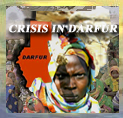![]()
International Criminal Court (The Hague)
Sudan: Questions and Answers on the Warrant of Arrest Issued for Omar Hassan Ahmad Al Bashir, President of Sudan
4 March 2009
Press release
On 4 March 2009, following a Prosecution Application, Pre-Trial Chamber I issued a warrant of arrest for Omar Hassan Ahmad Al Bashir, President of Sudan, for war crimes and crimes against humanity.
Who is Omar Hassan Ahmad Al Bashir?
Omar Hassan Ahmad Al Bashir, born in 1 January 1944 in Hoshe Bannaga (Sudan), is member of the Jaáli tribe of Northern Sudan. He is the President of the Republic of the Sudan since his appointment by the Revolutionary Command Council for National Salvation (RCC-NS) on 16 October 1993 and has been elected as such successively since 1 April 1996.
Why did the Court issue a warrant of arrest against Al Bashir?
The Judges considered that there are reasonable grounds to believe that Al Bashir bears personal responsibility as an indirect co-perpetrator, or as an indirect perpetrator, under article 25(3)(a) of the Statute for:
-
five counts of crimes against humanity: murder - Article 7(1)(a); extermination - Article 7(1)(b); forcible transfer - Article 7(1)(d)); torture - Article 7(1)(f); and rape - Article 7(1)(g);
-
two counts of war crimes: intentionally directing attacks against a civilian population as such or against individual civilians not taking direct part in hostilities - article 8(2)(e)(i); and pillaging - Article 8(2)(e)(v).
The Judges, by majority, found that the materials provided by the Prosecution failed to provide reasonable grounds to believe that the Government of Sudan acted with a specific intent to destroy in whole or in part the Fur, Masalit and Zaghawa groups. Consequently, the warrant of arrest does not include any charge for genocide.
What is a warrant of arrest?
A warrant of arrest is an order issued by a Pre-Trial Chamber for the purpose of arresting a suspect. After reviewing the application and evidence or other information submitted by the Prosecution, the Chamber issues a warrant of arrest if it is satisfied that there are reasonable grounds to believe that the person has committed a crime within the jurisdiction of the Court, and that his or her arrest appears necessary.
The warrant of arrest allows a suspect to be taken into custody and surrendered to the Court, but does not prejudice the final decision on the guilt of the suspect.
Who are the Judges who issued the warrant of arrest?
The Pre-Trial Chamber I which delivered the warrant of arrest against Al Bashir is composed of presiding Judge Akua Kuenyehia (Ghana), Judge Anita Ušacka (Latvia) and Judge Sylvia Steiner (Brazil).
As President of Sudan, is Al Bashir not immune from prosecution?
The Judges are of the opinion that the current position of Al Bashir as Head of a State is irrelevant for the Court's jurisdiction.
The Rome Statute applies equally to all persons without any distinction based on official capacity. The official capacity as Head of State does not exempt a person from criminal responsibility under the Rome Statute. Furthermore, immunities or specific procedural rules related to the official capacity of a person, whether under national or international law, are not an obstacle for the Court's jurisdiction over such a person.
Who has to execute the warrant of arrest issued for Al Bashir?
The Court does not have an army or a police force. Cooperation of States is necessary to execute the warrants of arrest.
As directed by the Judges, the Registrar will transmit requests for cooperation seeking the arrest and surrender of Al Bashir to the States Parties to the Rome Statute, as well as to the United Nations Security Council members that are not States Parties. The Registrar will also transmit to any other State any additional request for arrest and surrender which may be necessary for the arrest and surrender of Al Bashir to the Court.
As the Chamber stressed, the UN Security Council in its resolution 1593 which referred the situation in Darfur to the ICC, urged "all States and concerned regional and other international organisations to cooperate fully" with the Court.
Does Sudan have to cooperate with the ICC?
The State of Sudan has the obligation to fully cooperate with the Court. As the Chamber emphasised, the United Nations Security Council resolution 1593 states "that the Government of Sudan and all other parties to the conflict in Darfur shall cooperate fully with and provide any necessary assistance to the Court and the Prosecutor", even though Sudan is not a State Party to the Rome Statute. As a member of the United Nations and according to articles 24(1) and 25 of the UN Charter, Sudan must comply with Security Council resolutions adopted under Chapter VII of the Charter of the United Nations.
If Sudan does not execute the warrant of arrest, what measures can the ICC take?
If Sudan fails to comply with its cooperation obligations to the Court, the Chamber may make a finding to that effect and decide to refer the matter to the UN Security Council.
If Al Bashir is arrested, what are the next steps?
Upon the execution of the warrant of arrest and surrender of the suspect to the Court, the Pre-Trial Chamber will inform him of the crimes which he is alleged to have committed and his rights under the Rome Statute. A confirmation hearing will be held within a reasonable time to determine whether there are substantial grounds to believe that he committed the crimes charged. If the charges are confirmed, the case will be referred to a Trial Chamber for trial. If the charges are rejected, the person will be released.
Does the ICC have jurisdiction over the situation in Darfur even though Sudan has not ratified the Rome Statute?
The situation in Darfur was referred to the International Criminal Court by United Nations Security Council resolution 1593. This referral is lawful under article 13(b) of the Rome Statute. The resolution also applies to United Nations Member States, including Sudan, as it was adopted under Chapter VII of the Charter of the United Nations.
Is the ICC independent of the United Nations and the Security Council?
The ICC is an independent body whose mission is to try individuals for crimes within its jurisdiction without the need for a special mandate from the United Nations. On 4 October 2004 the ICC and the United Nations signed an agreement governing their institutional relationship.
Are there other cases related to alleged crimes in Darfur?
In the situation of Darfur, two warrants of arrest have already been issued on May 2007 for Ahmad Harun (Minister for Humanitarian Affairs) and Ali Kushayb (alleged commander of the Janjaweed militia), both suspected of having committed war crimes and crimes against humanity. The Judges are also considering the Prosecutor's request for the issuance of warrants of arrest for three rebel commanders for the attack against the peacekeeping force in Haskanita on 29 September 2007.
This is not an official document. It is intended for public information only.
Copyright © 2009 International Criminal Court. All rights reserved. Distributed by AllAfrica Global Media (allAfrica.com).






